#lyrics of woody guthrie
Explore tagged Tumblr posts
Text
On The Jukebox: Dropkick Murphys - “Okemah Rising (Lyrics Of Woody Guthrie)”

Featuring guest appearances from Violent Femmes (on “Gotta Get To Peekskill”), Jesse Ahern (on “Rippin Up The Boundary Line”) and Jaime Wyatt (on “Bring It Home” and “When I Was A Little Boy”).
1 note
·
View note
Text

there's a better world that's a-comin', I'll tell you why
#art#illustration#watercolor#painting#no fuckin cops#trumpet vine#native plants#acab#sticker design#lyrics from woody guthrie#bigeelsart
196 notes
·
View notes
Text

Woody Guthrie: Songs and Art • Words and Wisdom by Nora Guthrie and Robert Santelli
an assortment of Woody Guthrie quotes, signatures, and poetry
#woody guthrie#folk#photos#old photo#40s#folk music#american folk#quotes#folk revival#american folk revival#1940s#lyrics#poetry#poems#old country
6 notes
·
View notes
Text

this land is your land alternate verses my beloved
6 notes
·
View notes
Text
WOODY GUTHRIE "Ingrid Bergman"
Ingrid Bergman, Ingrid Bergman, Let´s go make a picture On the island of Stromboli Ingrid Bergman
Ingrid Bergman, you´re so perty, You´d make any mountain quiver You´d make my fire fly from the crater Ingrid Bergman
This old mountain it´s been waiting All its life for you to work it For your hand to touch the hard rock, Ingrid Bergman
If you´ll walk across my camera, I will flash the world your story, I will pay you more than money, Ingrid Bergman
Not by pennies dimes nor quarters, But with happy sons and daughters, And they´ll sing around Stromboli, Ingrid Bergman

3 notes
·
View notes
Text
A reminder to listen to lyrics before you judge a musician by music genre.
Both assholes and saints come in all forms of music.
The kids on TikTok think that just because he was a classic country singer, Johnny Cash was conservative??? My babies he covered a Nine Inch Nails song in his seventies.
Classic country singers (the majority of which came from poor roots) were always talking about how much The Man sucked because they were taking money from poor rural folk. You’re gonna tell me that’s conservative?? Get outta here.
#music#don’t even get me started on dolly parton and woodie guthrie#kiddos just say you hate country music don’t slander shit we have receipts for#listen to the lyrics
126K notes
·
View notes
Video
youtube
Deportee (Plane Crash At Los Gatos) Woody Guthrie
0 notes
Text

Well, I know that, since 2002, Democrats have been trying to push peacemakers out of the party, a position that ramped up since 2016. (In 2016, I remember when the "U-S-A" chants drowned out the "No More Wars" chants from many Bernie supporters.)
And Mr. McCausland may be like many people (including the Democrats that picked them...) who don't listen to the lyrics to those songs...
1 note
·
View note
Text
God's Promise
I didn't promise you skies painted blue
Not all colored flowers all your days through
I didn't promise you, sun with no rain
Joys without sorrows, peace without pain.
All that I promise is strength for this day,
Rest for my worker, and light on your way.
I give you truth when you need it, my help from above,
Undying friendship, my unfailing love.
I never did promise you crowns without trials,
Food with no hard sweat, your tears without smiles,
Hot sunny days without cold wintry snows,
No vict'ry without fightin', no laughs without woes.
All that I promise is strength for this day,
Rest for my, worker, my light on your way,
I give you truth when you need it, my help from above,
Undying friendship, my unfailing love.
I sure didn't say I'd give you heaven on earth,
A life with no labor no struggles no deaths,
No earthquakes no dryspells, no fire flames no droughts,
No slaving no hungers, no blizzards no blights.
All that I promise is strength for this day,
Rest for my worker, my light on your way,
I give you truth when you need it, my help from above,
Undying friendship, my unfailing love.
I promise you power, this minute this hour,
The power you need when you fall down to bleed,
I give you my peace, and my strength to pull home
My love for all races all creeds and all kinds.
My flavors my saviors my creeds of all kinds,
My love for my saviors, all colors all kinds,
My love for my races all creeders all kinds,
My saviors my flavors my dancers all kinds,
My dancers my prancers my singers all kinds,
My flavors my saviors my dancers all kinds.
by Woody Guthrie
0 notes
Text
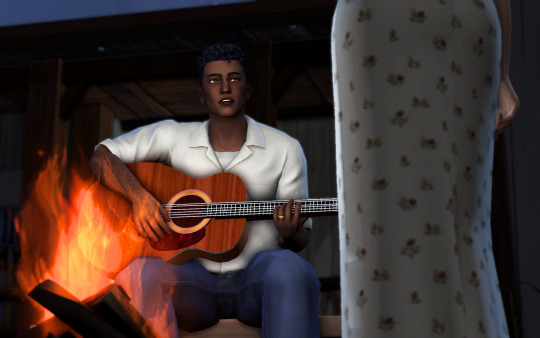
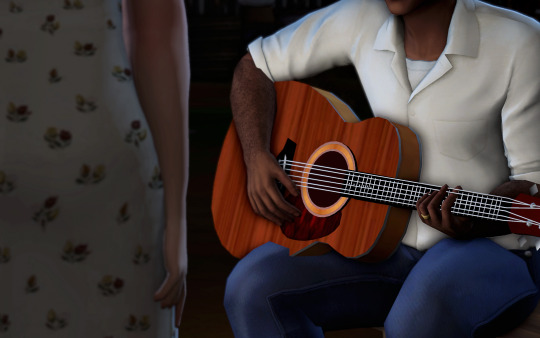
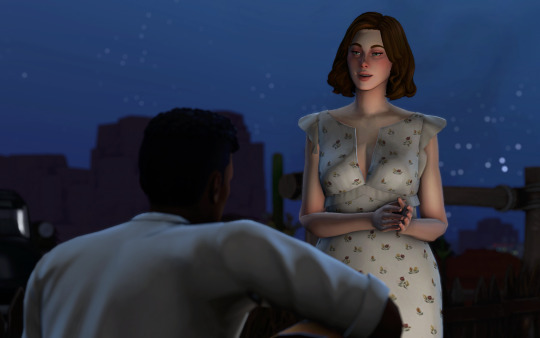
Long before the last note Antoine had grown aware of Zelda’s presence; but as he finished, he looked up at her with a newfound vulnerability in his eyes. As she stared at him unmoving, he absentmindedly moved his hand along the strings to fill the quiet left by the watching stars, “Was it alright, you think? Writing lyrics, it’s new. Harder than assembling notes, if you ask me.”
She looked at him in amazed silence. His original piano pieces had been brilliant, and sometimes he had written ditties for her to sing, but never before had she heard him sing his own lyrics. She had always known how much he loved it - this place that he had left but that walked alongside him everywhere he went; but it was so much clearer this way, so full of both love and hate, loyalty and disdain, longing and relief, that it was difficult for anything other than music to encompass it.
She brought her hands together in something that may have been a clap if she wasn’t so afraid to disrupt the stillness of the desert air. On silent footsteps, she left her reverie behind and moved to sit where he had made room for her on the worn wooden bench.

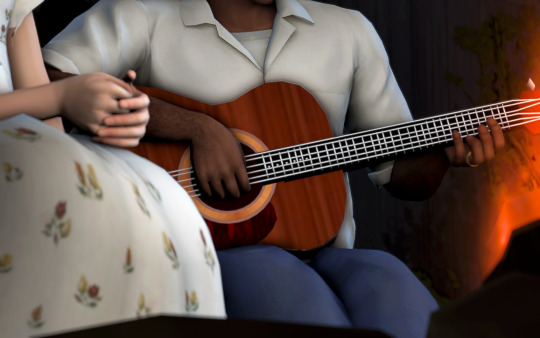

She looked at him earnestly, trying to ease his fear with even just the movement of her eyes, “It’s brilliant, Antoine, truly.” And she meant it, not just because she was under his spell and not her own now; the judgmental eyes of God and her sisters were shut out when she was in his orbit. Now there was only him and his memories for her to get lost in.
He left his hands on the strings, still playing the familiar notes as though they helped make the admittance easier to utter, “You were right, you know? When I play it’s like I can see it all laid out in front of me. Or better yet, under me. Like I’m above it, observing it all like a story. Makes me realize I loved it more than I thought I did. That house. That place. Her. I wrote it because I know it’s gone now, probably nothing but rubble under a cheap government build. I just don’t want to forget. Or maybe I don’t want the world to forget.”

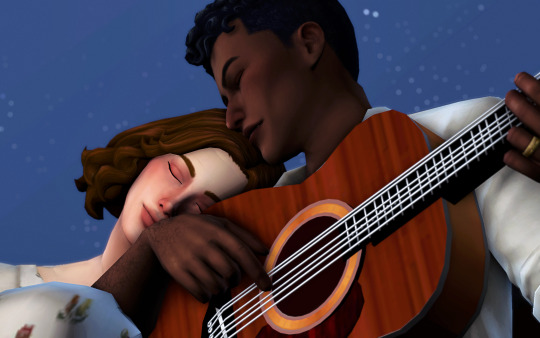
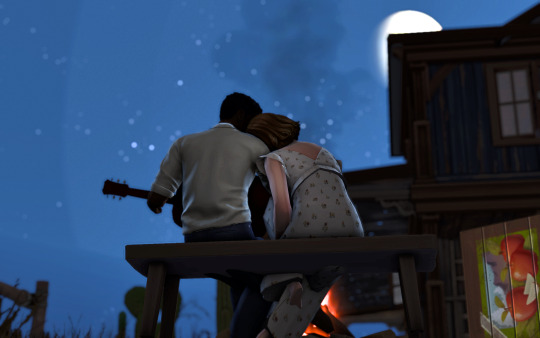

The stars looked down on them as his smile widened with every inch she drew closer to him. They reflected brightly in her eyes as she leveled them to his, “Would you sing it again? So I can hear it better?”
He let out a small laugh, just as much in relief as in humor. “Surely you would prefer to sing it? With a voice like yours I would hate to imagine what mine must sound like.”
She brought her knee up on the bench with them, curling as close as she could without dislodging the guitar from his arms. “Hush and sing. You don’t need me now.”
“I always will, Mrs. Duplanchier. No matter what. But as you wish….” 🎶
Part 3/3
Previous / Next
(As Antoine is meant to have written House of the Rising Son in this universe, I’m going to leave a little disclaimer about this song and its origins under the cut, in case you are interested!)
The origins of the song House of the Rising Sun are much older and more complicated than I have presented here. Folklorist Alan Lomax has written more on it if you are interested, but it is commonly thought to have originated as an English folk song, morphing into the version we know today amongst various groups of American immigrants.
Perhaps best known for its 1964 version by The Animals, it has long formed a staple of American folk, blues, rock, and country recordings, with recorded versions by everyone from Lead Belly, Woody Guthrie, Doc Watson, Nina Simone, Dolly Parton, Joni Mitchell, Bob Dylan, and Alt-J (amongst so many others). However, I have taken inspiration from the earliest known recorded version, which was done in Appalachia in 1933.
Of course, in having Antoine write this song I have compressed much of this history into a single figure, as well as slightly twisted the meaning of the song to fit the story line. The latter is mostly based on personal interpretation of the lyrics and is purposefully meant to draw a line from this family’s musical heritage through the 1960s and beyond. It also gives a face to the very real figures behind many of the staples of American music that have come to us from the early part of the 20th century, many of which were written or played by black men and women whose songs have continued onward while many of their names and stories may have been forgotten.
#1934#sims 4 historical#ts4 historical#ts4 decades challenge#sims 4 decades challenge#the darlingtons#sims 4 legacy#ts4 legacy#sims 4 story#ts4 story#Zelda Darlington#Antoine Duplanchier#1930s
137 notes
·
View notes
Text

july 14
1912
Woody Guthrie is born in Okemah, Oklahoma. He writes thousands of songs, many that remain unrecorded as lyric sheets in the Guthrie Archives.
60 notes
·
View notes
Text

Sid Grossman Woody Guthrie, New York City c.1948
"This song is Copyrighted in U.S., under Seal of Copyright #154085, for a period of 28 years, and anybody caught singin it without our permission will be mighty good friends of ours, cause we don't give a darn. Publish it. Write it. Sing it. Swing to it. Yodel it. We wrote it, that's all we wanted to do." Woody Guthrie, message on mimeographed copies of his lyrics distributed to fans during the 1930s
113 notes
·
View notes
Text

Timothée Chalamet Is Uncanny as Bob Dylan in ‘A Complete Unknown’
Timothée Chalamet stars and sings as a young Bob Dylan during his rise and stumbles to the top of music
By Jacque Kennedy | Rolling Stone Australia | January 17, 2025 📸: Searchlight Pictures
If you were wondering why James Mangold chose that “like a complete unknown, like a rolling stone” lyric to title his Bob Dylan biopic, it might be because that’s how Dylan literally arrived on the scene in 1961: completely unknown. Just a young guy with a guitar case, a notebook of songs, and a huck finn cap pulled low over a mop of tousled brown hair, searching for his folk idol, Woody Guthrie, as well as something bigger than the small town he’d hitched a ride from.
From the moment Timothée Chalamet steps into frame on the streets of New York City, it’s clear he’s mastered Dylan’s slightly hunched posture and awkward charm with uncanny precision. But his Dylan isn’t just a mimicry of the man, it’s a distillation of his contradictions: the arrogance, the vulnerability, the brilliance, and the aloofness that made him an icon. Chalamet has this way of tipping his chin slightly down, gazing through thick eyelashes directly into the soul of the person he’s talking or singing to. You never quite know exactly what he’s thinking, but that’s the point, and the film doesn’t try to over-explain.
In fact, every so often during A Complete Unknown, you find yourself questioning what’s true and what’s embellished. Where, exactly, in the north country did Dylan come from? Did he really run away to a carnival? Was he actually that reluctant to his growing fame? Some would expect a big Hollywood biopic to operate with historical and chronological accuracy, but when the subject is the great, enigmatic Dylan, you can afford to take some creative license. After all, Dylan himself was a master of spinning stories. Over the years, it seems bending the truth has become a natural part of the singer’s creative process. In A Complete Unknown, Mangold doesn’t shy away from any of this: his dishonesty, his selfishness, his stubbornness. “You are so completely full of shit,” Joan Baez, Dylan’s longtime collaborator and lover, says outright to him during one of their many arguments. But ultimately, the film never loses sight of Dylan’s genius and pure, unfiltered talent as the reason why he achieved all he did.
While A Complete Unknown chronicles Dylan’s ascent in the busy four years leading up to his controversial performance at the 1965 Newport Folk Festival, it’s equally concerned with what fame does to a person. Dylan’s central relationships with girlfriend Sylvie Russo (Elle Fanning), Joan Baez (Monica Barbaro), and mentor Pete Seeger (Edward Norton) become a lens through which Mangold explores themes of ambition, loyalty, and loneliness.
Elle Fanning’s Russo is the emotional anchor of the film, her arc tracing the very relatable sacrifices of loving someone as driven and inscrutable as Dylan. As we watch their relationship unfold, it’s clear his obsession with music doesn’t leave much room for her in his world. “Are you God, Bob?” Russo asks at one point, exasperated. “How many times do I have to say this… yes,” he responds, kind of half-joking, half-serious. It leaves you wondering how a man who effortlessly connected with so many thousands of fans struggled to truly connect with those who deeply cared for him.

Dylan’s male relationships are equally significant. His friendship with the legendary Johnny Cash (Boyd Holbrook), Bobby Neuwrith (Will Harrison), and Seeger offer glimpses of vulnerability. As much as the romantic relationships in his life, these men become the ones he turns to, confides in and seeks support as his star rises. Seeger’s eventual disapproval of Dylan’s turn toward electric music feels just as heartbreaking as his relationship breakdown with Russo. Like a father figure, Seeger tries guiding Dylan into making the “right” decisions for his career, and perhaps selfishly, for the folk genre. But Dylan doesn’t want to do what’s right – he wants to do what’s true, new and exciting.
Visually, A Complete Unknown is a triumph. The production design immerses you in the early 1960s, from the smoky Greenwich Village bars to the shabby apartments and grand concert halls. Arianne Phillips’ costume design charts Dylan’s transformation through 70 different outfit changes, from his scruffy folk beginnings to his rebellious sunglass-wearing rockstar phase.
But what really makes the film special is the music. Dylan’s personal life is interspersed with live performances that Mangold lets unfold naturally and unhurried. Chalamet’s singing feels unpolished in the best way, and whenever he’s on screen crooning Dylan’s lyrics with a guitar and harmonica you’re immediately drawn in. Some moments are stripped-down and powerful, like when Dylan performs “Song to Woody” by Guthrie’s hospital bedside, or when he tests a duet version of “Blowin’ in the Wind” in bed with Baez. While other moments are intense and energetic, Chalamet’s voice carries across theatres and festival stages as if he were transporting us all back there. By the time the credits roll after Dylan’s infamous electric performance of “Like a Rolling Stone” to a crowd of angry folk fans and even angrier executives, you’re left craving more.
If this were fiction, you might assume the main character just blew up his world and relationships with nothing but challenges ahead. But, of course, we know that’s not what happens for Dylan. He goes on to achieve global success with that electric album, becoming the voice of a generation, and is still performing 60 years later. Yet in some ways, even after all the hits and headlines, he’s still that alluring, mysterious guy that first arrived in New York – completely unknown.
12 notes
·
View notes
Text
The reason Dylan became popular was simply that his sound was very similar to the Beatles. He was absolutely not a copycat, but it's pretty undeniable. The Beatles and Dylan debuted around the same time. Dylan's first offering- a collection of Woody Guthrie and Dave Van Ronk covers, with only one original composition- flopped hard; the Beatles met with immediate success. Dylan altered his sound in a more Rockabilly direction modeled after Johnny Cash, but sticking with English Folk influenced lyrics- his next album took off. Why? Because American teenagers couldn't see John Lennon until 1964 so they saw Dylan.
The Folk scene was not jealous of Dylan nor did they hold him back. Electric instrumentation had featured at Newport from its inception. Bo Diddly and John Lee Hooker- founding fathers of Electric Blues- headlined the original 1959 show. Johnny Cash- an entirely electric act for most of his career- debuted at Newport the same year as Dylan as did Phil Ochs. Cash and Ochs both played electric: Dylan played acoustic.
The reason for the riot at Newport '65 is very straightforward: 1) Dylan did not perform the five song structure acts signed onto at that time, he played two songs and stepped away- ripping off fans and causing the initial round of heckling, 2) Pete Seeger and Allen Ginsberg approached Dylan's manager- Albert Grossman- to get Dylan to go back on and fulfill his obligation: Grossman initially refused and referred to Seeger and Ginsberg by the f-slur and used the k-slur on Ginsberg angering Seeger and bystanders, and 3) Grossman eventually relented- at Dylan's request- but only if they cranked the distortion on their amp's beyond its capacity in order to damage Newport's sound system and crash the festival: he also gave Dylan's drummer an SS helmet to wear. This offense sparked the riot.
Dylan was booed because Dylan was an asshole.
#folk music#pete seeger#johnny cash#phil ochs#woody guthrie#dave van ronk#bob dylan#i don't hate dylan i hate his biographers#like dylan has admitted to and apologized for all this stuff#also there were people in the audience mad that dylan abandoned joan baez but it was mostly fucking over the concert
15 notes
·
View notes
Note
For the song ask! 1, 2, 33! :)
Music Asks
1. first song that comes to mind
I listened to Woody Guthrie's Dust Bowl ballad "So Long, It's Been Good to Know Yuh" while evacuating from the fires, and while driving supplies through the ashen city in the following weeks. I finally unpacked my guitar a few days ago and I'm now learning how to play the song.
My friends and I are talking about getting tattoos to honor our hometown, and I'm considering adding lyrics to mine:
"We talked of the end of the world, and then We'd sing a song and then sing it again…”
2. song you would impress a potential mate with
I immediately interpreted this the British way and I only later realized it might mean romantic partner 😅
I once drove a coworker home from a game night and decided I'd become comfortable enough with them to start getting weird. So I made the very deliberate choice to sing along to the entirety of "Idiot Wind" by Bob Dylan (eight-minute epic divorce song) and do the voice. I don't know if that's what sealed it, but we did become friends (and she started humming along by the end) 🤷🏻
"You'll never know the hurt I suffered Nor the pain I rise above And I'll never know the same about you Your holiness or your kind of love And it makes me feel so sorry..."
33. extremely underground song, that probably nobody's heard
I don't want to dox @courfeyracs-swordcane, so all I'll say is that one of his high school teachers wrote an absolutely bananas folk horror song that ey showed to us at the very very beginning of Aristos, and none of us have stopped thinking about it since. This song has 3K views on YouTube and unquantifiable acres of real estate in my brain.
10 notes
·
View notes
Text
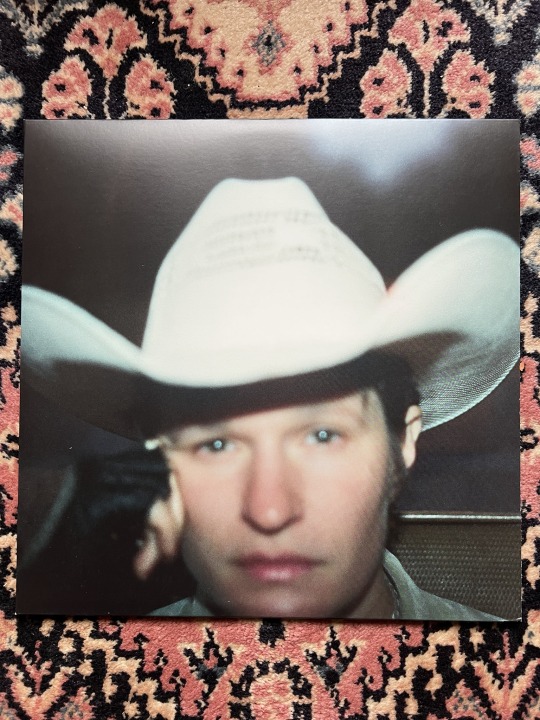
Every Record I Own - Day 840: Adrianne Lenker Bright Future
This is one of my favorite albums of 2024.
I love the American singer-songwriter tradition. But my love for the genre isn't so strong that I'll fall for any simple folk or country song. On the contrary, the older I get, the more particular I get about Americana. Yes, I love the Woodie Guthrie adage about only needing two chords and how the rest is just showing off. Yes, I stand with David Berman's statement that "all my favorite singers couldn't sing." I don't need an artist to reinvent the wheel with a simple 1-4-5 chord progression and a verse / chorus format. But does the world need another song written around the same handful of cowboy chords we've heard a thousand times before?
I guess the trick in the 21st century is to somehow take a very established tradition and to inject yourself into it in such a way that your songs feel comforting and intimate while also somehow making the listener see the world (or themselves) a little differently. And there are fewer and fewer artists able to do that. Really, it's been years since a singer-songwriter has put out a record that's hit me as hard as Adrianne Lenker's album Bright Future.
Lenker has an established career as both a solo artist and as a member of the folk indie outfit Big Thief, but both were completely new to me as of 2024. Perhaps this album sounds differently to someone steeped in her past work, but for me, it sounds like a collection of twelve songs that have gestated in an artist's repertoire for an entire lifetime. The songs are primarily centered around Lenker's voice and acoustic guitar. There's some piano, some strings, some electric guitar, and some vocal harmonies to round things out, but Bright Future is ultimately an album centered around a loan figure singing their songs against a sparse backdrop.
The songs are very much rooted in American folk music, though Lenker sounds like someone who is as happy with the unadorned approach to the singer-songwriter approach (see "No Machine") as she is with slightly more adventurous studio embellishments (see "Fool"). But Bright Future shines because Lenker's wavering and lilting voice, nimble but modest instrumentation, and simple storytelling are thoroughly captivating in their own right, and her decision to err on the side of leaving things naked, frail, and exposed gives the album greater dimension than if her arrangements were buried in studio magic.
Lyrically, Bright Future touches upon the heavily-tread subjects of love and heartbreak but provides a fresh prospective on the vulnerability and sacrifice that comes with it. There's also a healthy dose of recollection on a troubled childhood, but it's framed more as a relatable obstacle to intimacy as opposed to the more common reveling in personal trauma we've heard in a lot of modern indie / underground music from the last decade. Rather than basking in psychological damage, Lenker addresses her struggles as if they're a universal experience, another part of life that we must simply deal with if we're to move forward.
And ultimately, what makes Bright Future so powerful is that it conveys a sense of joy and hope despite life's inevitable losses and pain. Lenker's music generally relies on major chords, with the crucial minor thrown in for emotional weight. And that sonic balance between light and dark perfectly suits the emotional timbre of her stories. It's an album that celebrates love and happiness by occasionally referencing the harsh inverse experiences.
7 notes
·
View notes